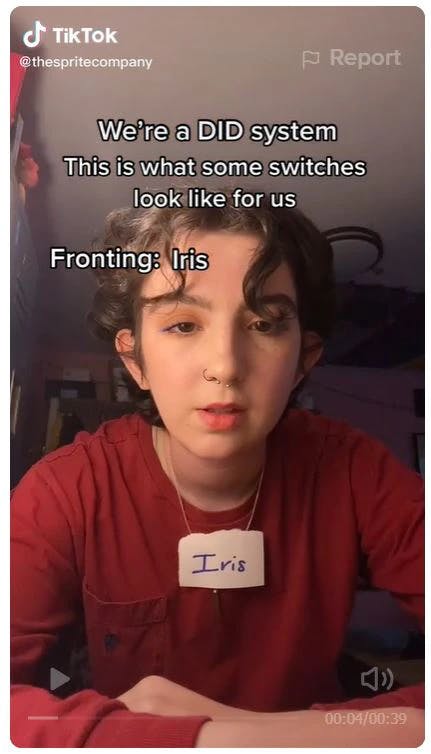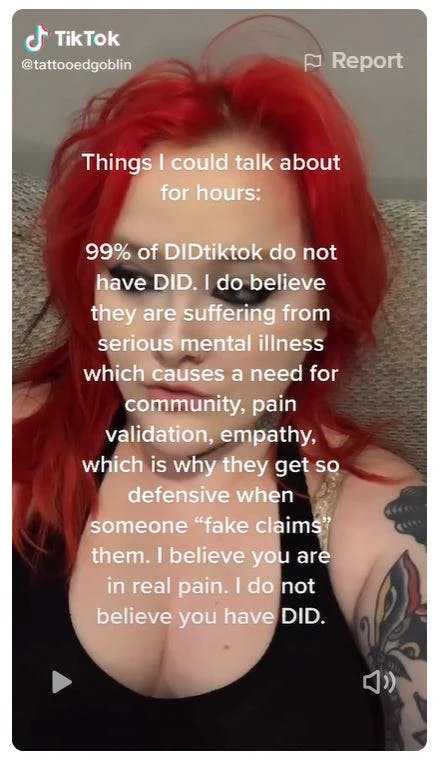Gen Z Is Romanticizing Multiple Personality Disorder On TikTok For The Likes
Borderline Personality Disorder, Multiple Personality Disorder, Tourette’s. What started as a generation riddled with eating disorders and anxiety has risen to greater heights.

Ah, social media. Just the place to go looking for uplifting inspiration and positive mental guidance, right? Right?
We’ve all heard of stories like Girl, Interrupted, Speak, Virgin Suicides, and To the Bone. They’re stories that grapple with mental illness, eating disorders, and self-harm and showcase the very raw and real effects these illnesses have. The downfall? Well, as with all entertainment, these stories only show an embellished and often glamorized peek at these illnesses. Something TikTok has been all too quick to replicate.
Tic-Tok: Tourette’s as a Trend
During the pandemic, a rise in young girls adopting “tic-like” behavior was reported. Many doctors believe this directly correlates with the rise of conditions like Tourette’s being popularized on TikTok.
Jess, the creator shown above, has gained a following of 4 million on her TikTok platform. Her content, primarily, revolves around her tics. With this single video amassing over 13.5 million views and over 3 million likes, it’s not hard to imagine hundreds of thousands of girls finding out about a very real but unfortunately very replicable condition. Another user by the tag @baylen.dupree on TikTok creates similar content, bringing awareness to the reality and struggles of living with Tourette’s.
With over 200,000 cases of Tourette’s recorded a year, it’s not as though the syndrome is rare. But rarely do we see it to such a degree and with such recognition as we’re seeing in these viral videos. For many young girls, this could be their first time witnessing symptoms. And what they see is a viral video through a narrow lens of what Tourette’s really is.
One Platform, Multiple Voices
Dissociative Identity Disorder (previously known as Multiple Personality Disorder) is a mental disorder affecting about 1.5% of the public and 3% of patients admitted to psychiatric hospitals in Europe and North America. Though the presentation of the disorder varies from patient to patient, the main characterization is the perpetuation of two or more apparent states of personality. The impact social media outlets like TikTok have when it comes to DID is similar to the effect of self-harm being normalized across social media a few years ago. Normalization, as we all know, leads to romanticism. And without proper education and understanding of these mental disorders, that’s exactly what young creators are doing; creating content that’s heavily selective on what aspects of mental illness are shown.

Watch on TikTok
Though I won’t be the one to claim whether the symptoms expressed in some of these viral videos are real or falsified, the fact remains that a curtain has been opened. Mental illnesses displayed on social media are a new normal, leading many young and impressionable people with little to no knowledge about these illnesses to believe that they, too, might have what it takes to be diagnosed with multiple personality disorder or the like. The chances of this are, obviously, slim.

Watch on TikTok
The “trendiness” behind DID’s display on TikTok has increased so much that even others diagnosed with the illness are calling creators out for faking and abusing this disorder.
A New Victim Card To Play
“Why would they fake it?” “People don’t usually fake mental disorders.” “Don’t invalidate them or their illness.”
While social media has been a great outlet to bring awareness and advocacy to mental health, there’s no ignoring the fact that adding a “tone of trend” to these health issues is only furthering a divide between entertainment and education when it comes to mental health. There are few things that consistently garner attention and likes on social media. Everyone has a story, everyone has a joke, everyone has life tips. Not everyone, however, has a mental disorder they can share and capitalize on.
Everyone has a story. Not everyone has a mental disorder they can share and capitalize on.
The app has garnered so much attention with trends that we’ve completely disregarded how said trends can affect others with their disorders. One of the latest being those sharing their self-harm relapses with the lyrics “She never really quits, she just says she did” from the song “Cigarettes out the Window” by TV Girl. The trend brought in tons of backlash as complaints arose about others relapsing into their self-harm habits after seeing the trending posts on their For You Page.
Many users on the app claimed creators were just posting for the sake of garnering attention. Some even stated that posters of the video were trying “to be like Euphoria characters,” a reference to the HBO television show’s self-destructive themes often being glamorized.
The why behind users and creators capitalizing on their mental disorders is simple – social media is used for attention. There’s no way around it. Likes, comments, follows, it feeds the fire we all build when we create a page. TikTok is one of the biggest social media platforms, garnering some of the biggest followings with little to no effort behind content.
Closing Thoughts
Awareness of the many, many mental disorders that affect our society is a noble cause, but social media has done a poor job at separating education from entertainment, and this is blatantly transparent when we look at TikTok and the often insensitive trends its users are responsible for.
Readers make our world go round. Make your voice heard in the official Evie reader survey.